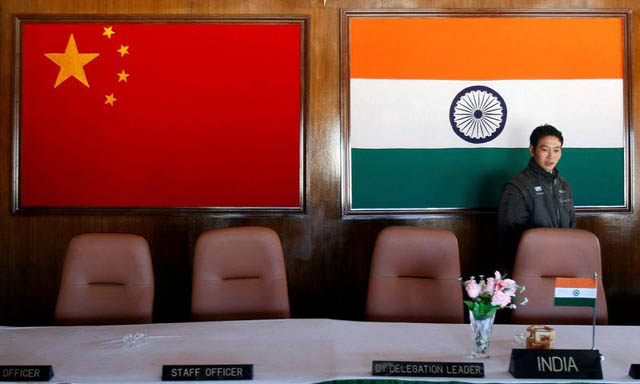
Indian and Chinese troops have been embroiled in the seven-week confrontation on the Doklam plateau, claimed by both China and India's tiny ally, Bhutan.
The sources, who were briefed on the deployment, said they did not expect the tensions, involving about 300 soldiers on each side standing a few hundred feet apart, to escalate into a conflict between the nuclear-armed neighbours, who fought a brief but bloody border war in 1962.
'Chance of war' between nuclear-armed China and India
But the military alert level had been raised as a matter of caution, two sources in New Delhi and in the eastern state of Sikkim told Reuters on the condition of anonymity because of the sensitivity of the matter.
The crisis began in June when a Chinese construction crew was found to be trying to extend a road in the Doklam region that both China and the mountainous nation of Bhutan claim as theirs.
India, which has special ties with Bhutan, sent its troops to stop the construction, igniting anger in Beijing which said New Delhi had no business to intervene, and demanded a unilateral troop withdrawal.
Prime Minister Narendra Modi's administration, though, has dug in its heels and said that the Chinese road activity in the region near the borders of India, Bhutan and China was a threat to the security of its own northeast region.
"The army has moved to a state that is called 'no war, no peace'," one of the sources said. Under the order issued to all troop formations in the eastern command a week ago, soldiers are supposed take up positions that are earmarked for them in the event of a war, the source said.
Each year, Indian troop formations deployed on the border go on such an "operational alert" usually in September and October. But this year the activity has been advanced in the eastern sector, the source in Sikkim, above which lies the area of the current standoff, said.
"Its out of caution. It has been done because of the situation," the source said. But the source stressed there was no additional force deployment and that the area was well defended.
The move comes as diplomatic efforts to break the stalemate failed to make headway, other sources with close ties to the Modi government told Reuters earlier in the week.
China has repeatedly warned of an escalation if India did not order its troops back. The state-controlled Global Times which has kept a barrage of hostile commentary said this week that if Modi continued the present course in the border, Beijing would have to take "counter-measures".
China may initiate ‘limited war’ with India
Ties between the neighbours have been souring over China's military assistance to India's arch rival Pakistan and its expanding presence in smaller nations in South Asia which New Delhi long regarded as its area of influence.
China has criticised the Modi government's public embrace of the Dalai Lama and its decision to let the Tibetan spiritual leader, whom it regards as a "dangerous splittist", to the Indian state of Arunachal Pradesh which China claims as its own.
China has also frowned at India's expanding military ties with the United States as well as Japan.
1731570357-0/elon-musk-(1)1731570357-0-405x300.webp)
-(1)1717678110-0/Kendrick-(1)-(1)1717678110-0-165x106.webp)





1732445375-0/Untitled-design-(9)1732445375-0-270x192.webp)


1732428810-0/Copy-of-Untitled-(3)1732428810-0-270x192.webp)






COMMENTS (3)
Comments are moderated and generally will be posted if they are on-topic and not abusive.
For more information, please see our Comments FAQ